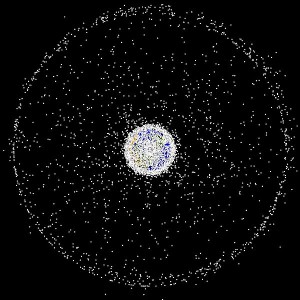The first satellite in space was Sputnik 1, launched by the Soviet Union in 1957. Since that time more than 6000 satellites have been launched. From the (estimated) 3600 satellites that are still in the orbit, about 1000 are operational.[1-3] The rest of them are more or less useless and part of the space-debris, which is becoming a more and more important problem.
But what are they doing all the time?
Satellites can be distinguished by their usage into various categories. News, science, earth observation, navigation and military satellites are only a few examples of the broad range of applications.
Just imagine. Your day starts with your alarm clock. It is an ordinary one, not a radio-controlled one, of course. After the first coffee you want to look up the weather forecast on your smartphone. No chance. Without weather satellites, a forecast is a possible but quite vague endeavor, but without adequate satellites, a smartphone is an absolutely useless device.
On your way to work you notice that your satnav is not working, either. Of course not, how should it, without GPS?! GPS is the magic word for our modern world. ATMs are reliant upon GPS, as well as airports, telephone, stock exchange and so on.
Without satellites we’d be able to survive, at least, but our lives would change in so many ways. Scenarios where confused people are walking around, fingers on a map, looking for an old-fashioned phone booth, are Hollywood-like and very improbable to happen.[4]
Back to space-debris. What is happening to all the hundreds and thousands of tons of scrap? After 3-8 years, a satellite retires. Modern satellites have special engines that transport them into space-graveyard, where they travel forevermore. Elderly ones vaporize upon re-entry into the atmosphere.[5]
So, without satellites our lives would be totally different, and the view of our blue planet won’t be blocked by thousands of tons of terrestrial garbage.– Katharina Stockhofe
References:
[1] Rising, David (11 November 2013). “Satellite hits Atlantic — but what about next one?”. Seattle Times
[2] Global Experts Agree Action Needed on Space Debris
[4] http://www.zeit.de/wissen/2012-07/esof-gps-sonnensturm
[5] http://www.aktiv-online.de/nachrichten/detailseite/news/wie-satelliten-unseren-alltag-bestimmen-3938
[6] https://commons.wikimedia.org/wiki/File:Debris-GEO1280_p.jpg
